
The Life and Times of Hubert Brooks M.C. C.D.
A Canadian Hero

 |
|
 |
Thursday Jan 15th, 1948. We docked in Southampton, England early Thursday morning. Ref: 8.17
During the voyage across the Atlantic, Coach Boucher had kept us somewhat in shape by ensuring all of us
did the long circle tour walk around the deck of the Queen Elizabeth several times a day.
(The shuffleboard really didn't count no matter how many times the guys appealed to Frank!)
The long trip across the Atlantic had allowed Ab Renaud to recover from a knee injury and rest and penicillin had allowed Roy Forbes to recover from an infected foot.
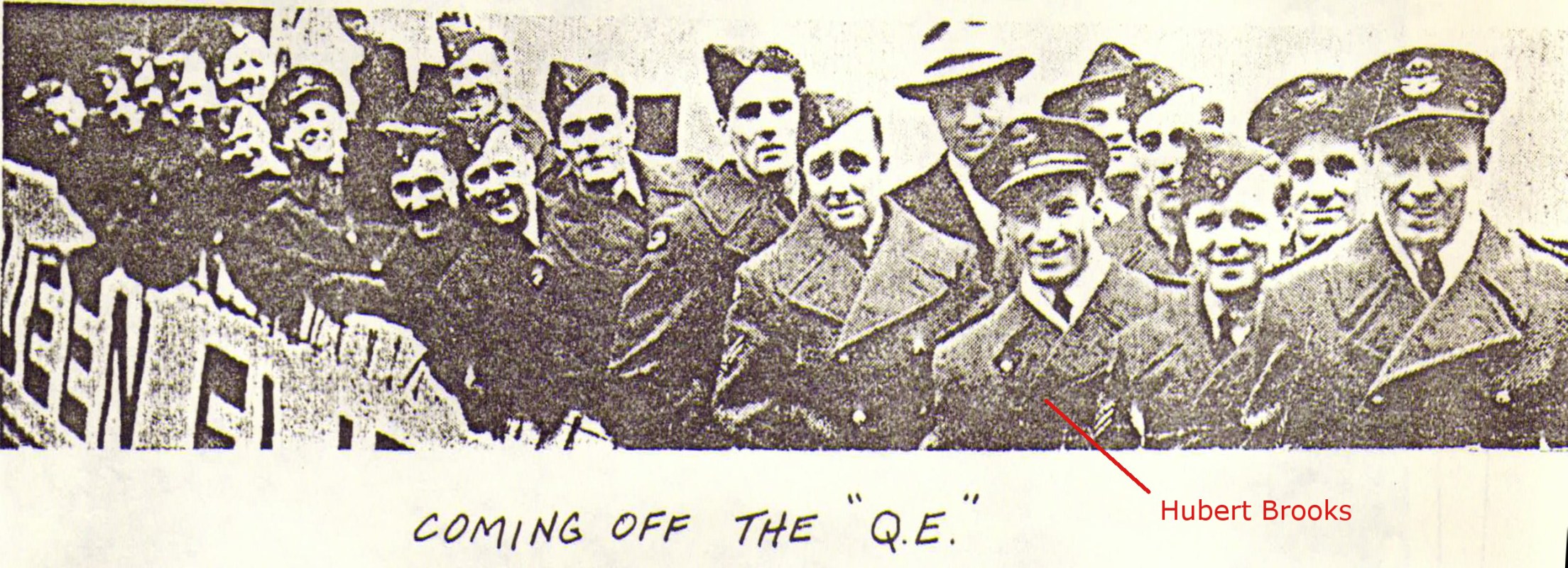

| |
|
We disembarked around 10AM and travelled by special bus to our London hotel - the Crofton Hotel.
No sooner had our bus started out than
we were rear ended by a tram!! We were picking glass out of our gear for some time thereafter.
Welcome to England!
Later that day we had a brief but spirited workout in preparation for the next days' exhibition game against
Britain's Streatham hockey club.
The Americans, who had practised just before us, stayed around for a bit to watch us. Their cocky attitude
changed a bit after they saw our fast paced workout.
We were amused that the British newspapers were dubbing us "Canada's mystery team".
Manager Sandy Watson responded;
"That's just fine; let's keep them guessing. We aren't just sure what we are up against either. Most of the other Olympic teams are
dark horses, just like us."
Our accommodations in windy, damp England gave new meaning to the word "sparse" and was in sharp contrast
to what we had aboard the Queen E (even in Tourist Class!) and what we had been used to in Canada.
The heating in the rooms was
unpredictable and when it was ‘on’ one could be forgiven for not realizing it. The lobby was so cold the receptionist wore a fur coat and gloves.
The post–war situation made the food situation
what only can be described at as ‘dire’. No milk, no butter, no sugar, no eggs, no bread.....and dinner was typically a ‘spam
concoction’ of unknown origin.
I, along with a few others, actually got sick for a day or two. I'd been able to withstand a few years living off the land in the mountains in
the south of Poland during the war, but the organisms mutating in the English food fare did a number on my stomach!
George Mara and Wally Haldler would have nothing to do with our "flea–bag" accommodations and grub and almost immediately moved
to a swankier hotel downtown.
Leading up to the Jan. 30th opening Olympic ceremony, we then had a number of exhibition hockey
games.
We almost literally sang for our supper, taking part in a series of exhibitions across Europe to raise money to eat, train and stay in modest
accommodations.
Unfortunately our ‘reputation’ preceded us and J.F. "Bunny" Ahearne, secretary of both the
British and International Ice Hockey Federations, and who helped the Flyers enormously in setting up their pre- and post- Olympic exhibition games,
informed Sandy that a number of
clubs wanted to cancel games against us (most notably the Swedish team). This was obviously devastating news, as we desperately needed the money.
It is not clear even to me at this later date how this situation was resolved, some speculated that (wealthy) George Mara played a role
in staking the team, but no one was talking.
Regardless, the exhibition games went ahead.
Playing at times on patchy outdoor rinks with inconsistent officiating we started coming together as a team. Coach Boucher progressively
focused on a few set lines – especially players who knew each other from prior amateur teaming.
We were to take on some top–flight amateur teams in and around London, and then headed for France and on to Switzerland.
Interestingly a good proportion of the players we played against in Europe were Canadians earning money off of hockey overseas!
(For example Le Racing Club de Paris team – who had notched an impressive 15 successive victories in the European league –
was described by a British sport writer – as being made up entirely of Canadians except for a couple of French boys who frequently have
trouble getting from one end of the rink to the other without falling down and consequently are rarely used – except when Le Racing
is about 8 goals up.) (Leave it to the British Press to subtly comment on the French.)
The exhibition series in Europe began on 16th January, one day after our ocean liner docked in Britain.
Results of our pre–Olympic exhibition hockey games were as follows:
| Date of Hockey Game | Score (RCAF Flyers vs. Opponent) | Opponent | Comment |
| Jan. 16th | 5–5 | Streatham | Located just south of London. Rated one of the English National League's best teams. |
| Jan. 19th | 7–6 | Brighton Tigers | Located in East Sussex on the south coast of
Great Britain. One of English National League's most successful teams |
| Jan. 21st | 3–5 | Paris Racing Club | Played in Paris, France |
| Jan. 23rd | 6–3 | Switzerland and link 2 | Played in Zurich, Switzerland |
| Jan 25th | 5–8 | Switzerland and link 2 | Played in Basel, Switzerland |
| Jan 27th | 10–3 | Davos Hockey Club | Played in Davos, Switzerland |
|
January 16, 1948 STREATHAM EXHIBITION GAME. That night, for some reason Renaud, Gilpin and myself were very sick (probably from some food that we ate) and hence we were unable to get much sleep. We were not in good shape for the practise scheduled for 8AM the next morning. Lines were shifted around for this practise with Gilpin and I playing on defence.
|
|
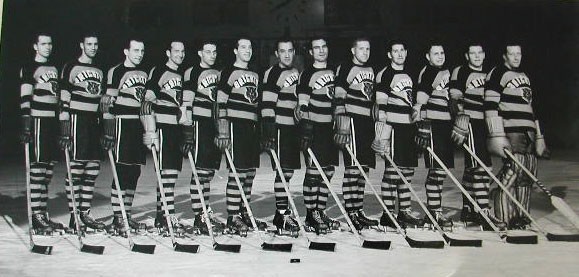
|
January 19, 1948 BRIGHTON TIGERS EXHIBITION GAME.
We were very encouraged with our 7–6 victory over the Brighton Tigers
squad.
Ref: 8.20 (Again made up mostly of Canadians.)
The game was played before almost 10,000 fans and went back and forth all game. Ted Hibberd
who clearly was our star in the game, scored the winning goal.
This was the Tigers first loss to a touring team in 2 years.
Three weeks prior the Tigers had beat the Czechoslovakian Olympic hockey team and the Czechs were considered the
hottest hockey team pursuing the gold medal.
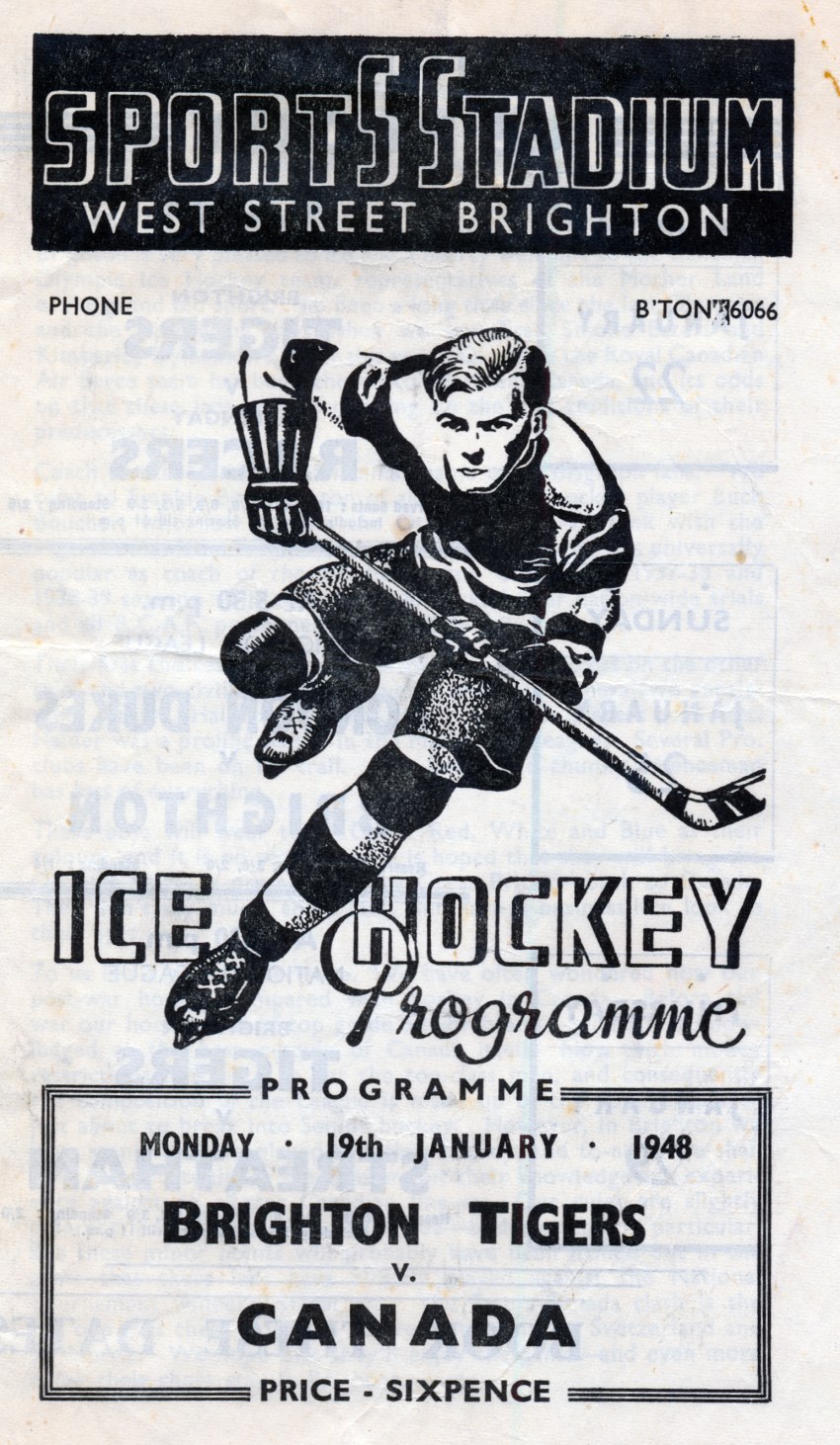
|

|

|
AND NOW A WORD FROM BUNNY AHEANE ........Before we left England, John "Bunny" Ahearne got Sandy's
permission to address the team. Sandy Watson and Frank Boucher were later to credit Ahearne with providing some of the
most relevant and timely advice that helped steer the team's overall approach and mindset going into the Olympics.
Ahearne's principle points were as follows:
He pointed out that, at the end of the Olympic competition, IF teams ended up "tied" with respect to games won and lost, the winner would be decided by computing the mathematical quotient of games won divided by games lost. Thus it was important to both score as many goals as possible as well as minimize the goals against.
He reviewed the international hockey rules and the calls that the "European" refs were likely to call.
He advised us to be very friendly to opposing players and help them to their feet when possible. This would have adesirable effect on the spectators, whose attitude could definetely sway the referees.
He insisted that "an important factor" was "the team's ability to relax during the game". Other European based teams would be under enormous pressure from game start to finish. European continental politics entered the picture significantly between certain European teams.
( He also gave the players tips as to what souvenirs to buy and where to buy it. Jewelry was very cheap in Czechoslovakia, watches in Switzerland, and scarves and perfume in France!)
These points and others were later re–iterated by Frank Boucher just before our 1st Olympic game and dictated Coach Boucher's mindset to pile on as many goals as possible whilst minimizing goals against. Perhaps there was a little healthy paranoia mixed in as well as a result of the mugging the team had received by the press. This also set the unfortunate stage for 6 of us when it came to designated player selection during the Olympic games.
Wednesday January 21, 1948 LE CLUB DE RACING DE PARIS EXHIBITION GAME.
The day before our next match in Paris was scheduled, we left Northolt Airport in Britain on a BEA Viking twin engine plane. We landed at Le Bourget airport at 4:30PM on January 20th. We were immediately bused to Paris City Hall to meet
Pierre De Gaulle who was the mayor of Paris. Pierre was the brother of Charles De Gaule. Photographs were taken and we were given a tour of City Hall. We were then wisked away to the Victoria Palace Hotel located
in the student quarter on la rue Blaise-Desgaffes.
Rooms were extremely poor with a musty smell throughout. Supper had been prearranged by our French hosts at a local restaurant - and we all got to "enjoy" horsemeat for the first time.
|
|
|
On January 21, 1948 we faced the strongest hockey team in Europe –
Le Club de Racing de Paris
Ref: 8.21
.
The team had won their previous 15 games from quality touring teams from Prague, Dundee and other points.
The team was made up of very good Canadian senior hockey players such as Ossie Carnegie, Manny McIntyre, Paul Lessard and Pete Bessone.
Our pre-game meal was again horsemeat!
There were about 15,000 fans on hand at the Palais des Sports for the 9PM game start.
Before the game, LE CLUB DE RACING DE PARIS team management had asked Sandy to have our team play a very clean game. The Paris Club
team then proceeded to do every dirty trick in the book! Sandy had to stitch up a gash on Forbes face on the bench.
The referees, an American and a Frenchman had only a casual acquaintance with the rules of the game.
We were leading 3-2 mid way through the second period when we just fell apart and ended up loosing 5-3.

|
The press weren't too kind with our 5–3 loss complaining that the team made numerous
"bonehead" plays which coughed up the puck and set up the French team for easy opportunities
Ref: 8.22
.
However we did end up with the handsome payment of 20,000 francs as our portion of the gate proceeds.
The next day, January 22nd we were to fly from Paris' Le Bourget airport to Zurich, Switzerland for our next pre-olympic hockey game.
Two planes had been arranged for the team and our equipment. The first was a RCAF Dakota aircraft provided by the Air Ministry in London to transport all of our hockey equipment along with Sandy Watson and George McFaul. The second was another Dakota aircraft operated by SwissAir
which was to transport the players. A number of players had a bit of fun at Sandy's expense, as Sandy hated flying and was clearly concerned that the planes would be flying between mountain ranges on the trip to
Zurich, as they did not have the capability to fly over the mountains. George McFaul later reported that Sandy squirmed and shook the whole flight into Zurich.
On 22nd January, the Canadian Press, reporting from St Moritz, predicted the final result in ice hockey! Czechoslovakia first, Sweden second and Switzerland third. Canada, it said, would be an also–ran. Not to worry, said the news wire service: "Canada's sweetheart, 18 year old Barbara Ann Scott, would do the country proud by winning the Women's figure skating gold medal." As much as they supported Barbara Ann, the military brass back in Ottawa was not thrilled with this assessment of their hockey team in Europe.
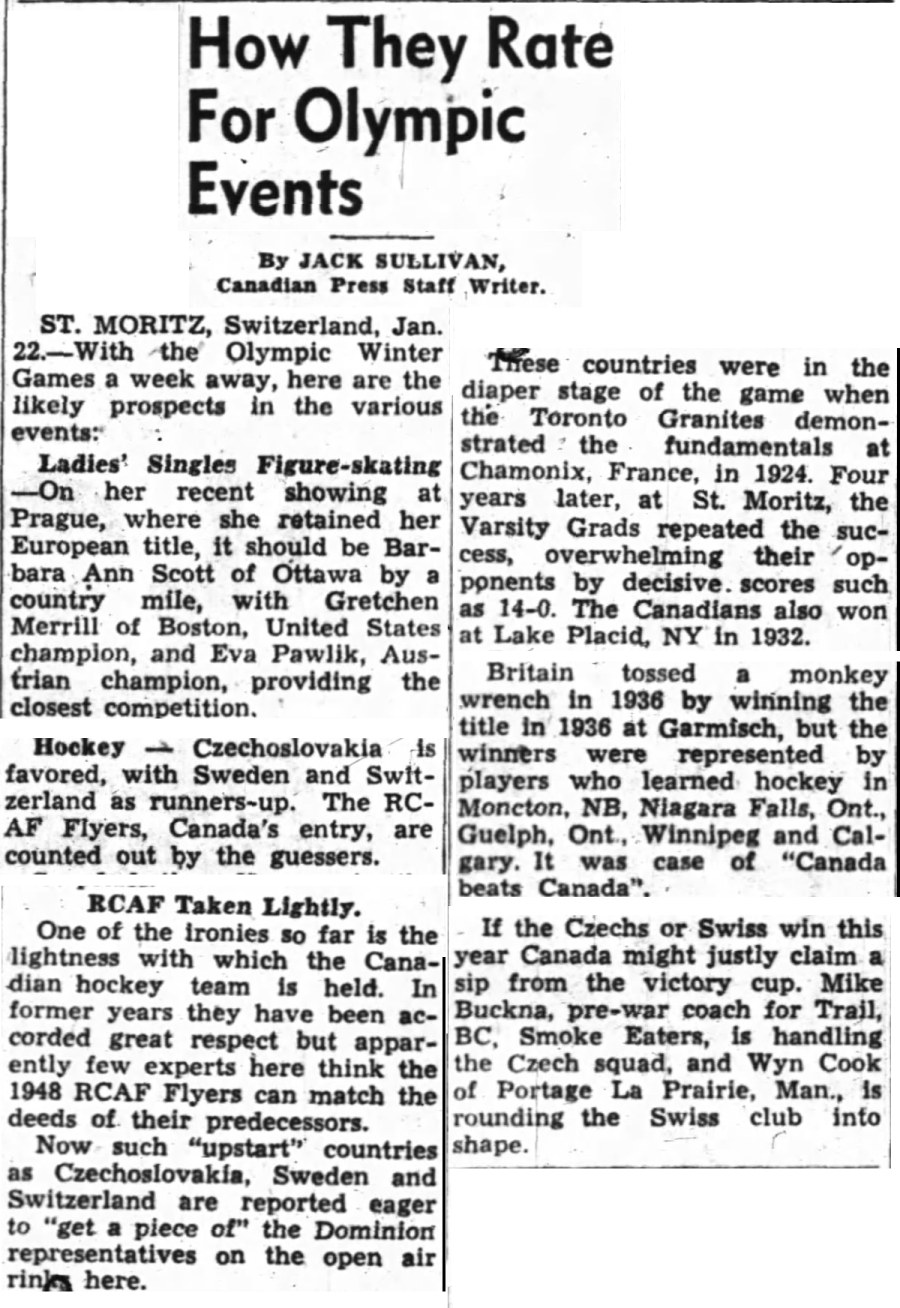
|
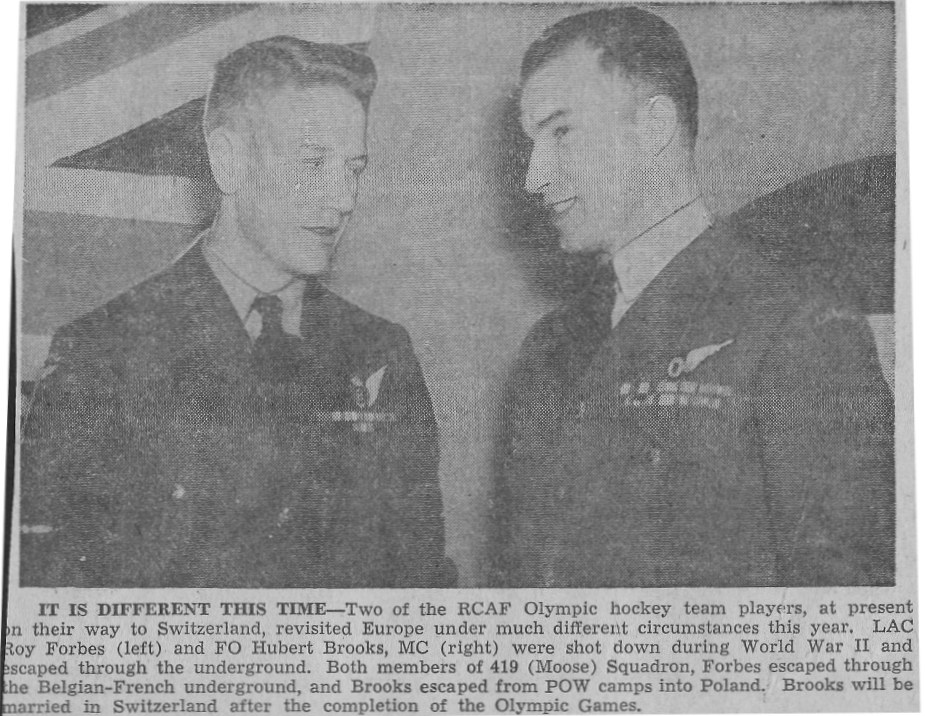
|
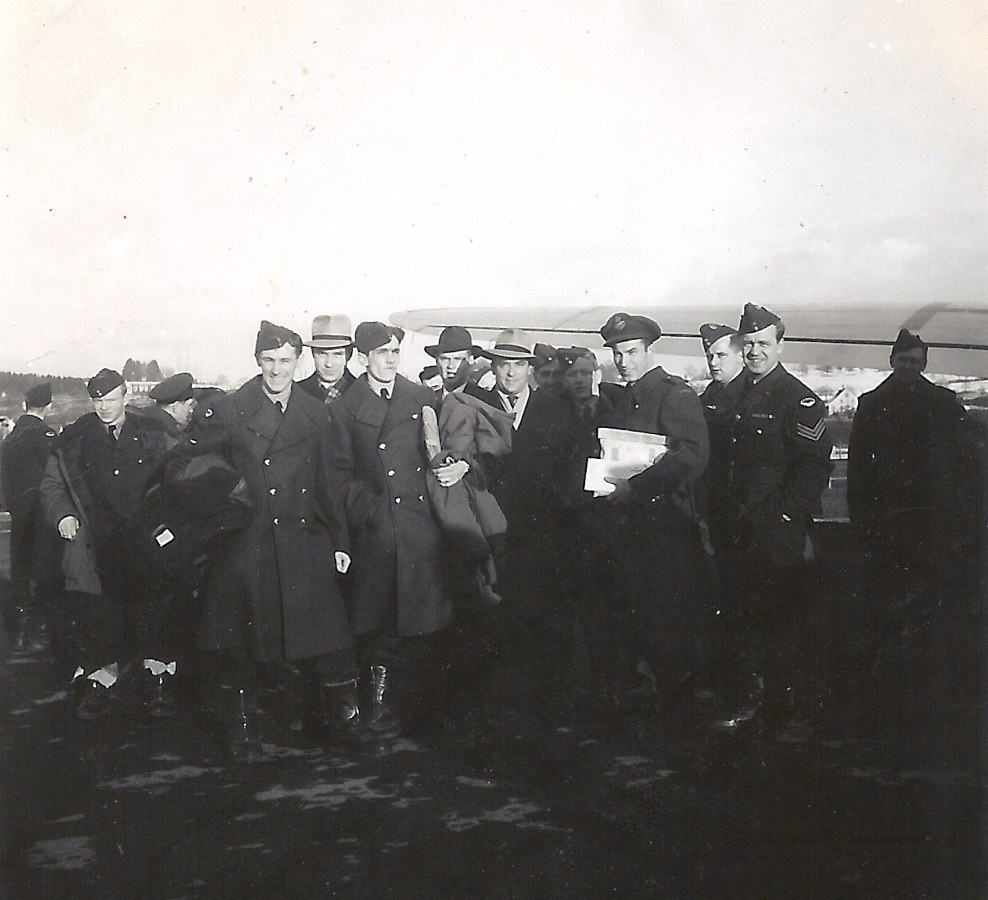
|
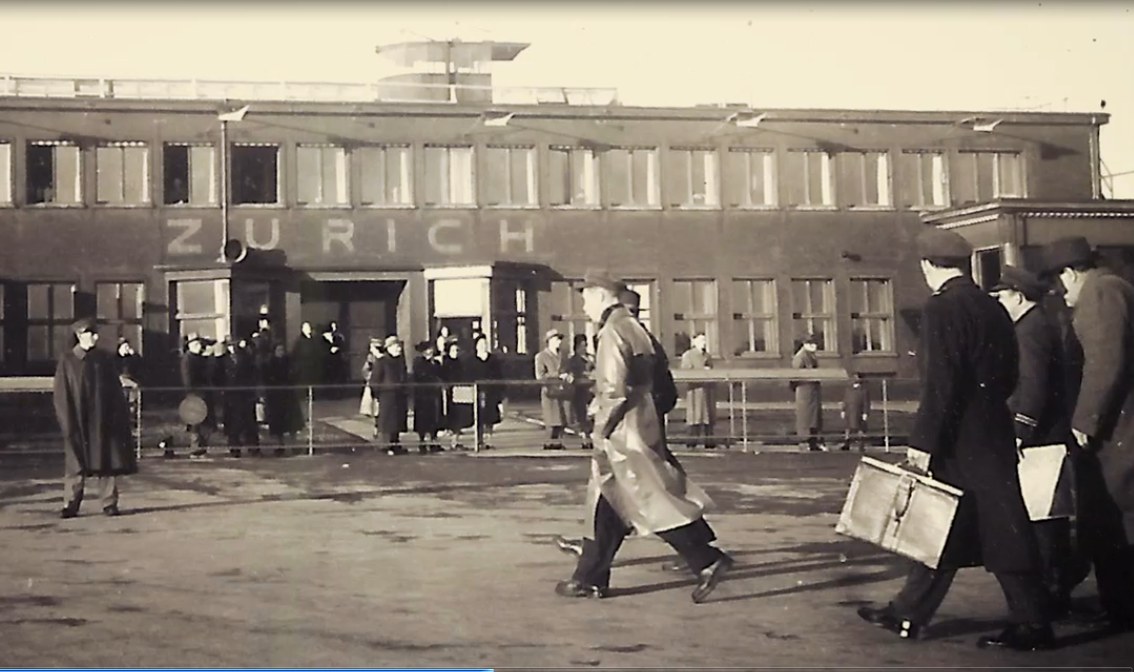
January 23, 1948 SWISS NATIONAL TEAM EXHIBITION GAME IN ZURICH.
We arrived in Zurich late in the afternoon of January 22nd and went immediately to our hotel the Dolder Grand Hotel. This hotel was like night and day compared to
the hotels we'd stayed at in England and France. We were in heaven with respect to be the lodging and the food!
Our 6–3 win January 23rd over the Swiss national
team in Zurich was played in front of 15,000 fans in the antiquated Dolder ice rink.
A steady rain fell throughout the game and as a
consequence the ice was terrible with pools of water and slush throughout. We were all soaked by the end of the game.
Frank Boucher commented after the game:
" The conditions were very bad but it turned out to be a pretty fair game and the boys looked good."
George Mara's family connections were able to supply us with some much appreciated cognac after the game. Throughout the Olympic pre–game
tournaments, George turned out to be quite the alcohol enabler for the very appreciative team - much to Sandy's annoyance!
The next day, Saturday, January 24th, we reluctantly left Zurich on a train for Bassel where we were to stay at the Euler Hotel. The Swiss team who we were to next play, also were on the train with us.
On January 24th this article appeared in the Stars & Stripes – an American military
newspaper commonly available to allied servicemen in Europe.
At the time we gave it scant notice thinking that this was political posturing which would be resolved well in advance of the Olympics:
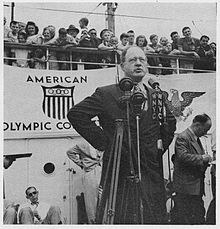
|
On January 26th the Stars & Stripes had a follow–up article:
![]() Amateurism Discussed By Olympics Officials by TED SMITS LONDON, Jan. 25 (AP)–
Amateurism Discussed By Olympics Officials by TED SMITS LONDON, Jan. 25 (AP)–
"Sport", says Avery Brundage, "is fun, amusement and recreation. The minute money enters in, it becomes work, just
as much as brick–laying."
En route to St. Moritz and the Winter Olympics Games which are involved in a bitter controversy over amateurism in ice hockey,
Brundage, president of the U.S. Olympic Committee, declared. "The decision on the issues at stake will affect the whole future
of sport and the games." Brundage will demand that the International Olympic Committee throw out the hockey team of the
Amateur Hockey Association. The tremendous growth of sports in the U.S. since 1900 has brought the whole issue of amateurism to the fore.
Briefly, one viewpoint is that athletes should be compensated for the time they spend training or competing. The amateur theory
is that athletes should compete for fun and recreation if they want to stay amateurs.
Olympic ‘Amateurism’ Defined
"We do not object to professional sport," said Brundage.
"It has its place, particularly if it is honest. But the question is where to draw the line."
The Olympic committee on amateurism makes this definition:
"An amateur is one whose connection with sport is and always has been solely for pleasure and for the physical, mental, or social
benefits he derives therefrom, and to whom sport is nothing more than recreation without material gain of any kind, direct or indirect."
As the result of the committee's study, all athletes competing in the 1948 Olympic Games, both at St. Moritz and in the summer in London, –
must sign this oath, which was revised by the committee and is being used for the first time:
"I, the undersigned, declare on my honor, that I am an amateur according to the rules of the International Federation governing my sport,
that I have participated in sport solely for pleasure and for the physical, mental or social benefits I derive therefrom; that sport to is nothing
more than a recreation without material gain of any kind, direct or indirect, and that I am eligible in all respects for participation in the
Olympic Games."
Uniform Code ‘Impossible’
This is known as the "new Olympic oath."
Brundage said he and his committee on amateurism "recognize that each sport has its own individual problems and therefore is
impossible that their regulations should be entirely uniform." For instance, he said, some sports permit amateurs to compete with
professionals, and others do not. "If most of the amateur participants are mature men, contact with professionals is not harmful. But
if they are boys of 18, it is another matter. The boys acquire the professional viewpoint without realizing it." Brundage
declared the reason why the dispute over ice hockey was so important (he is empowered by the U.S. committee to withdraw all American teams if
the AHA hockey team competes) is that "a line must be drawn and a stand taken if the Olympic ideals are to be preserved."
January 25, 1948 SWISS NATIONAL TEAM EXHIBITION GAME IN BASEL.
On January 25th we played against the Swiss National Team
in Basel. A number of players were under the weather with colds from the previous game held in the rain. We were also feeling the 6,000 ft altitude a bit as
well.
We loss a 8–5 decision in front of 16,000 fans. This was a complete reversal of form from our previous match against the Swiss and our team frankly tired after the first period when the score was deadlocked at two goals each.
Ab Renaud who scored 2 goals in the prior match against the Swiss again counted with a pair in this match. Halder, Mara and Guzzo got our other goals.
This was the only time during our entire pre–Olympic, Olympic and
post–Olympic tour that we lost to a national team.
Interestingly the boards in the outdoor rink were only about 12 inches high and a
lot of pucks were lost in the snow. This proved difficult for our team to adjust to, although the Swiss National team had no such problems.

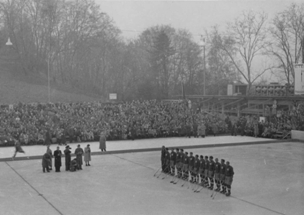
|
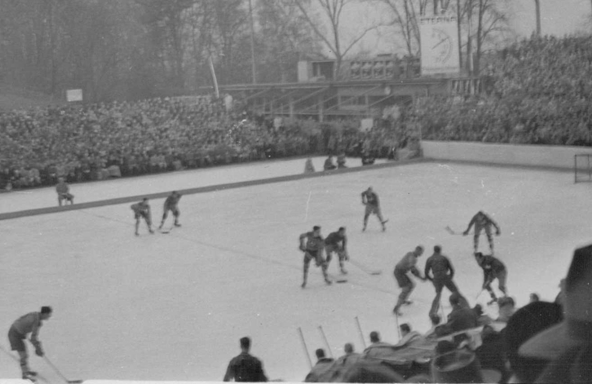
|
|
The following images are taken from the January 27, 1948 Swiss Magazine "TIP" (No. 4 Vol 27) of the pre-Olympic hockey game of the RCAF Flyers vs. Swiss Olympic Team held in Basel Switzerland on January 25 th. All images in this local section are provided Courtesy of the Estate of Pat Guzzo via his daughter Mary Rose.



|
Immediately following the hockey game, we boarded the train in Basel heading for Davos - changing trains in Zurich. We arrived in Davos around midnight and, exhausted, immediately checked in at the Palace Hotel.
(Editor's Note: According to Pat Guzzo's diary book (page 38): My Trip ... Journey of an Olympic Goal Win, "The game in Bassel was a heartbreaker for Doc and Frank.... Though the rules were different, we had to leave behind our Canadian boding checking strategies to obey the international code. ..... I was sure changes would take place and the lines would be shuffled. Wally Hadler seemed to be the only one holding up his end. George Mara would come around. Red Gravelle had been trying hard but couldn't put the puck in the net. However our 19 year old had to be given a chance. We had been very weak defensively allowing 27 goals against with only 26 scored. Andre Laperriere, another youngster, was another definite asset. Louis Lecompte and Frank Dunster hadn't as yet hit their stride. Our goalie, Murray Dowey, must have felt all alone between the posts. ")
It was clear however we had an all-star with Murray Dowey. "fast hands" - best glove man any of us had ever seen.
However this loss to the Swiss National Team just days before the start of the Olympics was like a punch in the guts to a lot of us. This was
probably the wake up call the team needed to buy into coach Boucher's defensive strategy.
Tuesday, January 27, 1948 DAVOS HOCKEY CLUB EXHIBITION GAME.
On the 27th we played our last pre–Olympic exhibition game
in front of a sold out crowd of 5,000 fans against the Davos Hockey Club (which also had a half dozen Swiss national team members added to it).
Schools had closed and fans from neighboring towns flocked to the open air stadium to see the game.
Frank changed the lineup considerably for this game. The first line of Halder, Schroeter and Renaud remained intact. Andy Gilpin replaced Guzzo at left wing with Mara and Hibberd while Guzzo was moved to left wing with Taylor and Gravelle.
We won the game 10–3; a good omen leading into the Olympics
Ref: 8.23
.
Wally Halder was outstanding in the game with 3 goals and Irving Taylor scored twice and also got 3 assists. Patsy Guzzo also got 2 goals with Schroeter, Hibbard and Renaud getting the others.
Frank Boucher commented:
"The boys are hitting their stride and getting use to the high altitude."
My fiancé Birthe Grontved met up with me in Davos and took a few pictures of the team during the game.

|
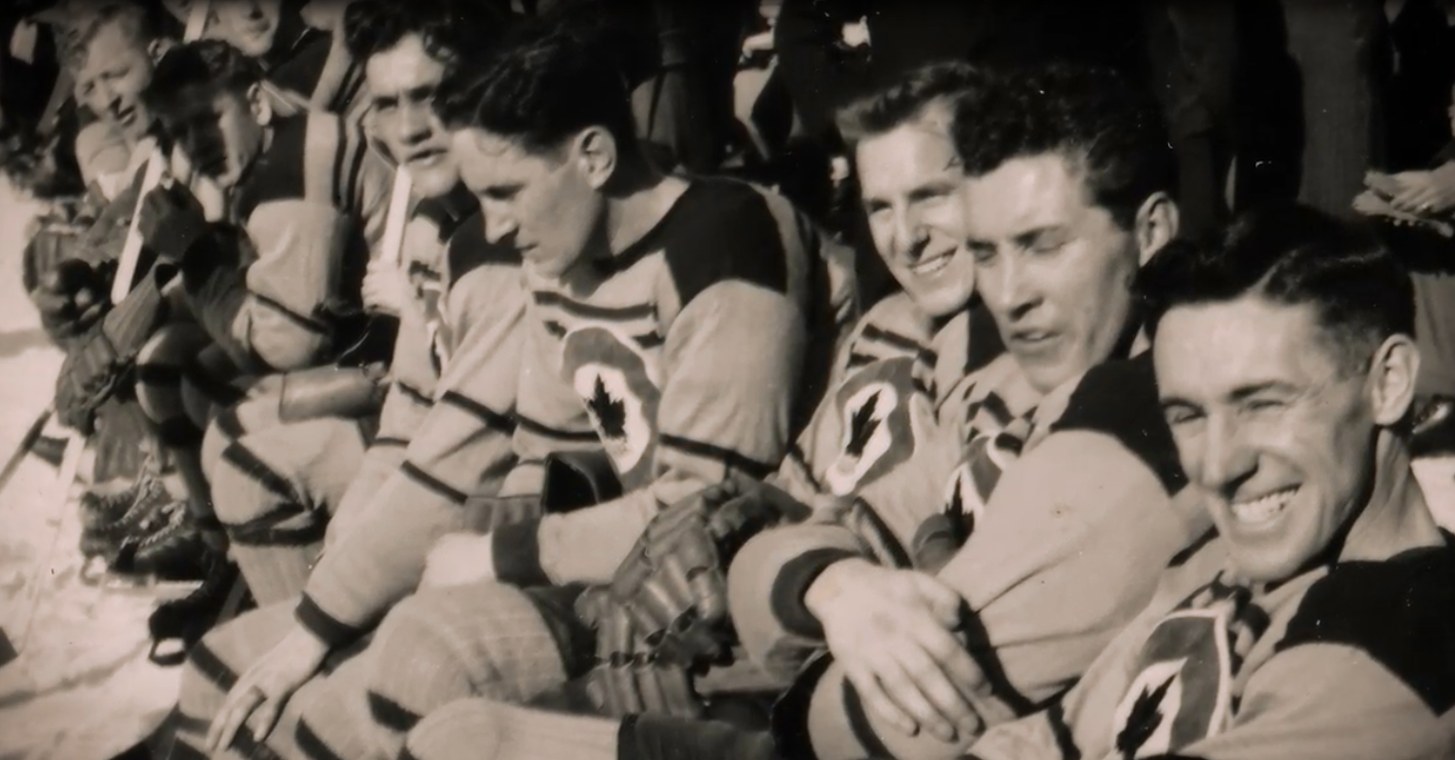
|

|
I continued to help Sandy when he had difficulties. Sandy was uni–lingual, whereas I spoke a number of languages and was able to effortlessly interact with the various organizational representatives of the teams. I ended up doing most of the money handling. I laughed when Ab Renaud remarked that I was "one of the few intellectuals on the team capable of doing this sort of thing."
(Editor's Note: According to Pat Guzzo's diary book (page 39): My Trip ... Journey of an Olympic Goal Win, after the 10-3 win over the Swiss team in Davos, "We (the team) still needed more togetherness, but that would come soon. Ten of of our players had been with us for just a handfull of games being played. The Olympic rules called for only 11 players which was an archaic rule. Six of us would not play. However a spare goalkeeper would be allowed, leaving 5 more to be cut before the opening game. ..... I do not know who will be dropped when the Olympic Games begin"
The next day, Wednesday, January the 28th we left at 1PM by train for St. Moritz and the Olympic Games. To get to St. Moritz we had to change trains, and when we did so found that there were no seats left - both the American and British teams had boarded prior to us. The ride was only an hour and a half up a very scenic mountain climb.
On the 28th Stars & Stripes had a follow–up article as the war of words intensified:
"Fraud," Says Brundage In Attack Against AHA ZURICH, Jan. 27 (UPI)–
Avery Brundage, president of the U. S. Olympic Committee, charged the American Hockey Association used "fraudulent" means to get
elected to the International Ice Hockey League, which is now sponsoring the AHA squad in its fight with the American Amateur Union hockey team
to represent the U. S. at the Winter games in St. Moritz.
Brundage said the AHA actually "was professional because it was sponsored by American ice rink managers."
ST. MORITZ, Jan. 27 (INS)–
The dispute over the U. S. Hockey entry in the Olympic Winter Games starting Friday led to the possibility that America will withdraw from
both the winter games and the full–scale Olympics at London next summer. Avery Brundage, president of the U. S. Olympic committee, came
out fighting at a news conference and said the committee is prepared to resign unless its hockey team is certified for the winter games. He
added: "If this should happen, it is the opinion of the committee that all American contestants also will retire from the winter games."
The American committee recently voted by a large majority to withdraw all Americans if the AAU squad was not accepted by the Olympic Committee
as the official U.S. squad. Under Olympic charter rules all contestants must be amateurs to compete in the Olympics. In addition, teams to qualify
for the games must be a member of an international federation of the sport in which they wish to enter. In this dispute, both teams have one
prerequisite. The AHA is a member of the IIHL but its application for play in the winter game was not forwarded by the American Olympic Committee.
The AAU team is not a member of the IIHL, designated by the Olympic Committee as the international organization for hockey, but its application
was accepted and forwarded by the U. S. Committee.
Also there was this article:
![]() Group Settles Hockey Plans For Olympics ST. MORITZ, Jan. 28 (UP)–
Group Settles Hockey Plans For Olympics ST. MORITZ, Jan. 28 (UP)–
After a lengthy argument the Ice Hockey Olympics Committee decided unanimously in favor of a total–point, non–elimination
championship covering the nine teams entered.
The last–minute acceptance of the Polish team, bringing the number of entrants to nine, complicated the issue and made a straight knockout
fight impossible.
Thirty–six games will be played over 10 days, commencing Friday on a number of rinks. Fears were expressed that bad weather might
delay seriously the ice hockey program. In this event, the committee will consider changing the present aggregate system to a straight knockout
competition.
The nine teams fighting this long series of matches are the U. S., Canada, Great Britain, Sweden, Switzerland, Czechoslovakia, Belgium, Italy
and Poland.
The playoff decided upon will match each of the nine teams against every other team once during the championships. A victory will count two
points and a tie one point In case of a tie, the team which has the best goal average will be adjudged the winner.
| PREVIOUS PAGE | GO TO TOP OF PAGE FOR INTER- and INTRA- CHAPTER NAVIGATION MENUS |
NEXT PAGE |
The Life and Times of Hubert Brooks M.C. C.D.